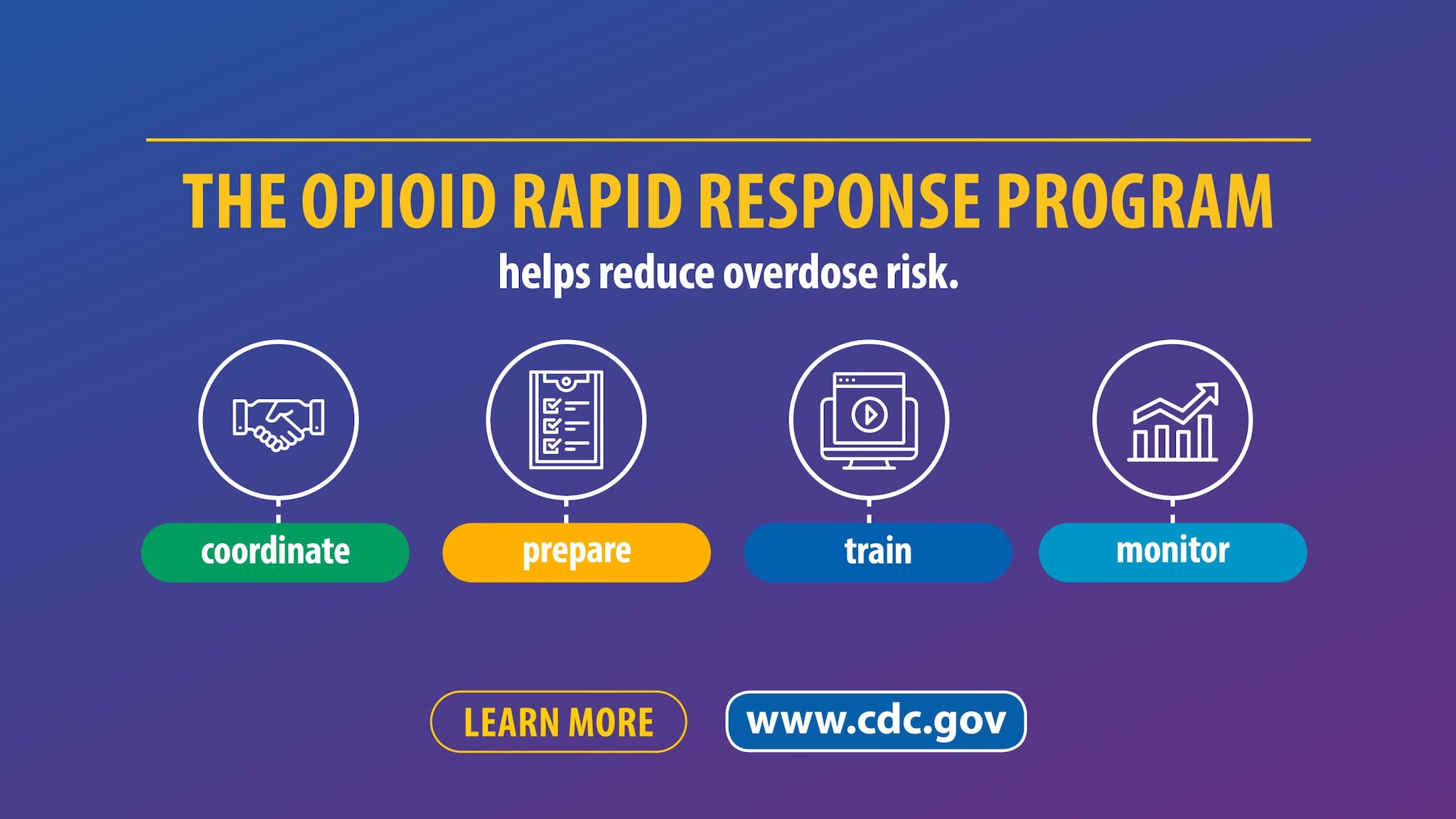At a glance
- The Opioid Rapid Response Program (ORRP) is a federal effort to reduce opioid overdose deaths. It is led by CDC, in coordination with The Office of the Inspector General within the U.S. Department of Health and Human Services.
- ORRP facilitates rapid state and local public health response when populations are affected by a care disruption that might increase overdose risk.
- CDC is not authorized to provide direct patient care, consultation, or referrals.

Overview
The ORRP is an interagency, coordinated federal effort to help mitigate overdose risks among patients who lose access to a prescriber of opioids, medications for opioid use disorder, or other controlled substances, such as benzodiazepines.
The program helps address care continuity and risk reduction for patients by alerting state health agencies about federal law enforcement events that might disrupt patients’ access to care and supporting state and local capacity building to prepare for and respond to disruptions in care.
ORRP’s role is to facilitate timely communication and coordination across state and federal health agencies and to ensure that available public health, healthcare, and treatment services supported by the federal government are known to and leveraged by state health officials working to mitigate risks among affected patients.
Disrupted access could be due to law enforcement actions or other events, such as the retirement, death, or voluntary closure by a clinician who prescribes controlled substances. ORRP helps address care continuity and risk reduction for patients by alerting state health agencies about federal law enforcement events that might disrupt patients’ access to care and supporting state and local capacity building to prepare for and respond to disruptions in care.
Keep in mind
Program impact
Since becoming a formal program managed by CDC's Division of Overdose Prevention in 2020, ORRP has:
- Established partnerships and implemented protocols with the Office of Inspector General within the U.S. Department of Health and Human Services (HHS OIG) and the Drug Enforcement Administration (DEA) to formalize timely notification and coordination of law enforcement activities that have the potential to disrupt patients' access to controlled substance medications.
- Maintained active partnerships with the Substance Abuse and Mental Health Services Administration (SAMHSA), the Health Resource and Services Administration (HRSA), and the Centers for Medicare and Medicaid Services (CMS), as well as the Office of the Assistant Secretary for Health (OASH) to ensure federal resources are leveraged by state and local public health agencies responding to a disruption.
- Completed the state preparedness scenario-based exercises with rapid response partners in partnership with the Association of State and Territorial Health Officials (ASTHO) to help response coordinators identify available resources to assist patients and the healthcare workforce during a disruption, as well as establish rapid response protocols, roles, and responsibilities.
- Developed capacity-building resources in partnership with ASTHO for state and territorial health departments and their partners. Supported web-based, case-based, clinical, peer learning (the ECHO model) for clinicians inheriting patients receiving long-term opioid therapy for chronic pain.
- Developed materials in coordination with ASTHO for state health departments and healthcare providers, focused on reducing stigma among people receiving opioid therapy for chronic pain.
Program priorities
ORRP supports primary, secondary, and tertiary overdose prevention by addressing sudden changes in patients’ access to prescription opioid therapy for chronic pain and other controlled substance medications, including medications for opioid use disorder (MOUD).
ORRP does not provide direct funding to state or local jurisdictions; rather, it provides rapid notification and technical assistance to health departments and direct service providers when disruptions occur because of a federal law enforcement action, as well as preparedness and capacity building technical assistance in advance of disruptions.
Response strategies implemented by jurisdictions may include
- Alerts to partners
- Direct patient outreach and risk communication
- Harm reduction
- Behavioral and mental health treatment and recovery services
- Healthcare access
- Crisis response
In addition, ORRP engages federal and national partners to identify and address systems-level factors that may affect patients’ access to care or care continuity.
Milestones
In 2020, ORRP became a formal program within CDC’s Division of Overdose Prevention, routinely implementing an established coordination protocol with law enforcement investigators at HHS OIG and state government health agencies.
By 2021, DEA formally implemented an ORRP notification protocol with all of its Pharmaceutical Investigations field agents, resulting in 2.3 times as many notifications to ORRP as there were before DEA implemented the protocol. These notifications are essential to inform health officials and facilitate rapid implementation strategies to reduce overdose and other health risks.
What we've accomplished
- Coordinated with public and behavioral health professionals in 40 states/territories to mitigate overdose risk among patients affected by disruptions and provided real-time technical assistance during disruptions.
- Received over 240 notifications from federal law enforcement about potential disruptions to healthcare for patients receiving controlled substance medications.
- In partnership with the Association of State and Territorial Health Officials (ASTHO), conducted more than 25 state preparedness exercises with rapid response partners, including state and local public health and behavioral health authorities, healthcare systems, clinicians, payers, emergency medical services, harm reduction service providers, peer recovery professionals, and others involved in rapid response planning.
Future direction
ORRP continues to support state, territorial, and local capacity building to enhance rapid response and risk mitigation when disruptions occur that have the potential to increase overdose risk among affected patients. Efforts to evaluate different rapid response strategies are being explored.
Resources
- Overview of CDC's Opioid Rapid Response Program (ORRP)
- Background and Description of ORRP
- ORRP's Trusted Contacts' Frequently Asked Questions (FAQs)
- Responding to Disruptions in Access to Opioid Prescriptions: A Guide for State Health Departments and Their Partners
- Opioid Preparedness: Disruptions in Access to Prescription Opioids | ASTHO
